Many translators would agree that there are two ways to translate something. While some of our clients appreciate that translations take time, require creativity and expertise, and may not word-for-word look like the original text, other clients may prefer a literal translation to be on the safe side, or may say something along the lines of “it doesn’t matter if it’s not perfect” or “as long as people can understand what it says”.
In fact, in this second case, some translation buyers might bypass looking for a professional translator and just run it through Google Translate, or go on one of the many “gig economy” websites to get someone to do it quickly and cheaply. This is fine, as long as you know what quality to expect; as I’ve mentioned in previous posts, sometimes you just need something quickly translated for internal use, since no-one is really going to see it, especially not customers or members of the public.
The trouble is when this second type of translation is used for something that will not only be presented to the public, but the public is expected to pay for, keep, and read for information. You need only look at the mystery shopping experiment that I conducted on Fiverr.com with my colleague Hannah to see that throwing a text through Google Translate and then giving it a few tweaks not only makes the end result clunky, but actually renders it less informative and useful than the original text.
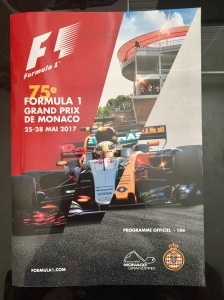
So anyway, last month, I went to Monaco to watch the Monaco Grand Prix with my partner. He, being a big F1 fan, decided to buy the souvenir brochure for €10, and I, knowing nothing about F1, read some of the programme so that I could get up to speed on what I was about to watch.
Obviously, it being Monaco, the programme is bilingual: the French text is followed by an English translation. Since Monaco is quite fancy and the Grand Prix is such a huge event, I thought that the organisers, the Automobile Club de Monaco, would have spared no expense on making sure that everything, from the circuit building to the marketing, ran smoothly throughout the event.
Imagine my surprise and disappointment, then, when I see the sorry state of the English section of the programme. And not in a pedantic “Ooh, I would have used an Oxford Comma there” way.
The English was an awkward, word-for-word translation…
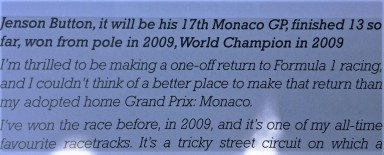
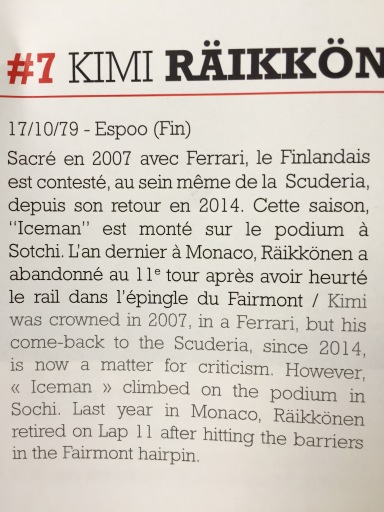
Along with French quotation marks being left in the English text (even when they weren’t used in the French)…
Some words were left in French…
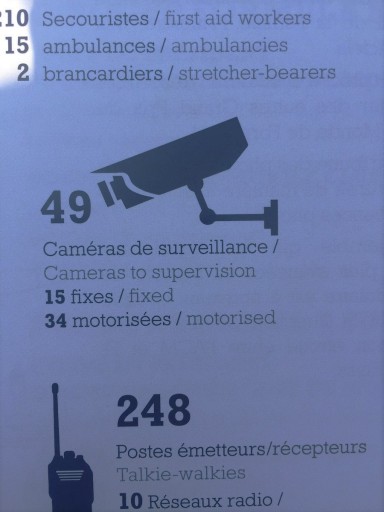
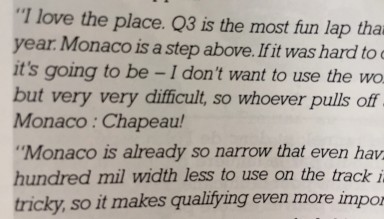
Top: talkie-walkies (as well as “Ambulancies” and “Cameras to supervision”); Bottom: chapeau!
There were some horrendous typos…
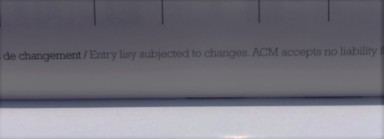
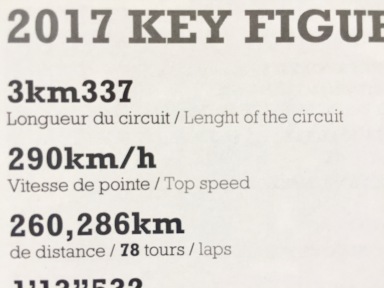
Lisy and Lenght. Sigh.
And some sentences that just made zero sense at all. PAYPAL a heavy price? Is that an autocorrect mistake?!
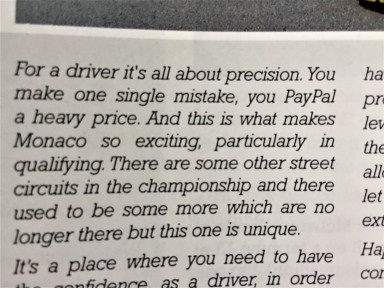
Or is it some new slang that I’m not yet familiar with?
Any professional translator, especially one that translates from French to English, would take one look at this programme and draw the following conclusions:
- The translator (and I’m guessing it has been translated by a human, due to the typos) was not a native speaker of English.
- They were probably French or Monegasque, since the English sentence structure is still very French and they thought that terms like “chapeau” and “talkie-walkie” were also used in English. A quick internet search would have shown them that “chapeau” can be translated to “bravo!” – a French word that we actually DO use in English.
- The programme sure as heck hasn’t been proofread, which suggests that…
- The translator may not have had very much time to finish this.
It has definitely been rushed. And that’s a real shame, because thousands of these programmes were distributed and sold throughout the 4-day event, so at €10 each, the Automobile Club de Monaco must have made a killing. Lots of motorsports fans would have wanted to buy one – and keep it as a souvenir too. Perhaps they’d even get their favourite driver to sign it, as there were quite a few autograph opportunities. Perhaps, for some people, it’s their first ever Grand Prix, so it has even more value for them.
And yet, the Automobile Club de Monaco didn’t think it necessary to give the appropriate time and resources towards getting the programme properly translated. If it were a case of one or two typos, then I might have forgiven them – but to have glaring mistakes on every page was really disappointing and certainly doesn’t make me want to read it again (except to point out the worst mistakes and post them online, like I’ve done here!).
So, how could the ACM, along with other businesses and organisations, avoid howlers like this in the future?
Hire a professional translator. Okay, this seems a bit obvious, but just because someone is charging you money, doesn’t mean that they’re professional or even any good. This translation should have been done by a native English speaker who is fluent in French, who can prove their credentials and experience.
Hire a translator with the technical expertise. I bet whoever translated this was a big F1 fan – that’s why they were happy to do it. But unfortunately, they were lacking the subject knowledge and marketing know-how in their target language: English. Find out if your translator has experience translating similar texts to yours, and, depending on the subject, the qualifications or training to back it up.
Give them enough time. Translations, especially marketing material, cannot be rushed. If you have a text that needs to go to print by a certain deadline, you need to think about starting the translation process weeks in advance, depending on how long the text is.
Hire a proofreader or editor. And make sure that you’ve taken proofreading into account when you’re looking at your budget and schedule. Even the best translators like to have a second pair of eyes to go through their text, to help spot typos (or in the above case, glaring errors) or even to suggest snappier titles or phrases.
A good translator will know what works and what doesn’t work in the new language, and will adapt the text accordingly. Feel free to ask about the choices they’ve made, but don’t insist on a literal translation if your translator says that it won’t work in the context. They may have to depart from the original text to make it just as engaging and fun for the new audience. Let them!
Bear in mind, too, that a translation like this takes time, and may cost more. At an international event like the Grand Prix, your translations should be viewed as an investment and a service for your customers and fans, not just an afterthought. But if done right, it’ll be worth it. Just think of your customers’ smiling faces!
Yikes! That is quite the gaffe. Thanks for sharing.
LikeLike
I know! I was pretty shocked. Thanks for reading!
LikeLike
Pingback: 3 challenges of translating tourism content | Bellingua Translations
I love attending sports events, and I’m afraid this situation is all too common. They invest a fortune in creating a stunning programme, with wonderful photos and excellent articles, but don’t invest in translation. Did you try to contact anyone at the Automobile Club de Monaco to tell them? The magazine is probably outsource to a publication company, in which case the Automobile Club de Monaco is probably being short-changed, as I’m sure they paid for a bilingual publication, not a publication in French with some dodgy English next to it.
If you did manage to speak to them, you can let me know how you got on during a coffee break next month in Brescia.
LikeLiked by 1 person
Thanks for reading, Tim! I tweeted the Club but they didn’t reply. It doesn’t mention in the brochure who wrote the English version, which is quite telling.
Are you going to the MET Conference? I’m not, unfortunately! Have a nice time, if you are!
LikeLike
Pingback: 6 ways a translator can help you or your business | Bellingua Translations
This is a nice piece on an all-too familiar scenario. As someone who also struggles to convince French companies to have their translations into English done by someone who is English mother tongue, it would be interesting to know if you eventually had any luck here.
LikeLike
This is a nice piece on an all-too familiar scenario. As someone who also struggles to convince French companies to have their English translation done by someone who is English mother tongue, it would be interesting to know if you eventually had any luck here.
LikeLike
Thanks, Aaron! I did write to them but unfortunately didn’t receive a reply. I’m interested to see if there has been any improvement on their brochures since I went in 2017 (but I’m not sure I can justify paying for Monaco GP tickets again just to read their literature!!)
LikeLike